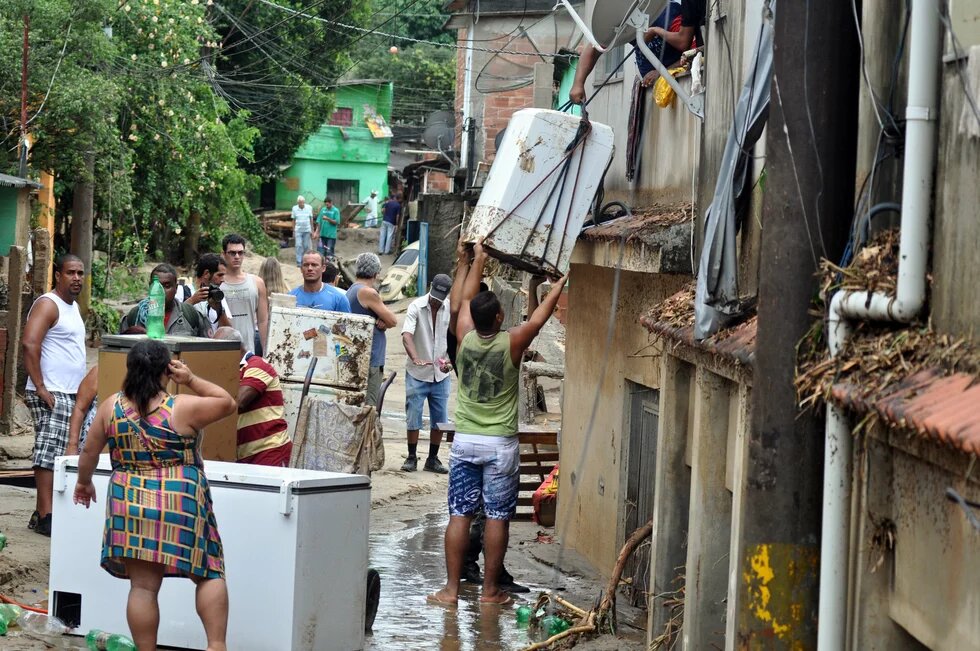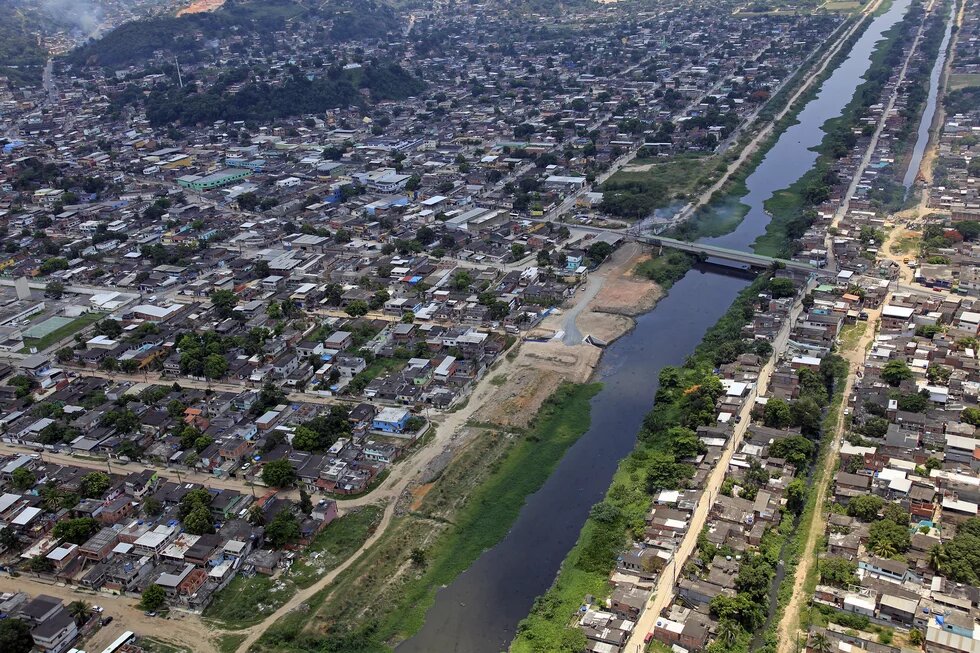
Vinícius Lopes, Co-Founder of the "O Clima é de Mudança" Coalition and Junior Researcher at Plataforma Cipó
The concept of climate racism has gained prominence in discussions about the impact of climate change, both locally and globally. Climate racism refers to the way historically marginalized populations—such as Black, Indigenous, and peripheral (low-income) communities—are disproportionately affected by environmental problems. Against a historical backdrop of inadequate public policies for these populations, the climate crisis exacerbates the daily challenges they face.

Currently, addressing the effects of climate change requires considering the problems experienced by much of Brazil. When we talk about these disproportionate impacts, we're referring to events like the landslides that devastate the mountainous region of Rio de Janeiro year after year, or the torrential rains that intensify every summer, leaving the outskirts and favelas (slums) flooded for days. Additionally, when new temperature records are broken, the most affected are those without access to air-conditioned spaces or clean drinking water.
When we talk about the effects of the climate crisis, it's not just about the lack of public policies or state negligence—we're talking about people. These people have color, race, and gender. As the Iyaleta Association points out, most of those affected by the climate crisis in Brazil are Black and live in peripheral areas.
Climate racism demonstrates that the likelihood of climate events is directly tied to the racial identity of a person or the nature of their territory. This doesn’t mean that only Black populations suffer from climate damage, but it highlights that due to Brazil’s socio-political and economic structures, the majority of homes in climate-vulnerable territories are occupied by Black people.
In an interview, Maria Clara Salvador, a researcher at the 215 Institute and co-founder of the Climate Change Coalition, remarked that “climate disasters create a cycle of impoverishment for the population. After a disaster, people lose their material possessions, personal belongings, and documents, which contributes to their social vulnerability and inequality—often the result of a historical process of racism.”
Policy must be grounded in intersectionality. Addressing climate racism goes beyond environmental issues—it means incorporating social, political, and economic factors into the discussion. That’s why, in the year when Brazil holds the presidency of the G20—the group of the world's 20 largest economies—civil society has been advocating for climate racism to be part of the discussions.
Social Participation and the Role of the Peripheries: Amplifying Local Voices in the Global Debate
The Group of 20 (G20), created in 1999 to coordinate the global economy, originally brought together finance ministers and central bank governors from the world’s major economies. Following the 2008 financial crisis, the G20 expanded its agenda to include issues like health, social justice, and climate change. Since then, the group—initially government-focused—has faced increasing pressure from activists and NGOs to include civil society in its discussions.
During Brazil's interim presidency of the G20, the thirteen engagement groups, representing various sectors of society, have organized to bring their perspectives to the political negotiations, aligning with the federal government’s priorities: fighting hunger, poverty, and inequality, promoting sustainable development, and reforming global governance.
In an effort to ensure greater civil society participation, the Brazilian government established the "Social G20," which will hold cross-cutting discussions with the thirteen engagement groups and initiatives of both the Sherpa Track (which focuses on policy and international coordination) and the Finance Track. In an interview, Maria Ribeiro, a participant in the Young Climate Negotiators program and member of the Rio G20 Committee, emphasized the significance of this Brazilian initiative: “For those of us from the periphery, seeking opportunities is part of our daily lives. When opportunities like this arise, we seize them without hesitation. Occupying these spaces and engaging in debates and decision-making shows the world our capacity and desire to change things—to transform our reality and that of others.”
In the hope of driving change and bringing local voices to the global stage, groups like the T20 (Think Tanks group) and C20 (Civil Society group) have been organizing participation processes since the beginning of the year, addressing various topics such as multilateral reform, inclusive digital transformation, and climate issues. Climate issues, in particular, have seen the highest level of engagement in both groups. In the T20, civic participation involved drafting Policy Briefs with political recommendations, which were compiled into the group’s final communiqué. The C20 process included meetings throughout the first half of the year, aiming to jointly produce policy recommendations that would form the group’s policy pack. In both cases, the outcomes were directed to the Financial and Sherpa Tracks by mid-2024.
In my experience monitoring both efforts, it was fascinating to observe the construction of these spaces as part of a collective effort to ensure that the G20 in Brazil aligns with the government’s motto regarding social participation, despite the forum's history of closed-door negotiations.
Challenges in Including Climate Racism on the G20 Agenda
Multilateral negotiations, by nature, involve complex political processes. At the G20 under Brazil’s interim presidency, civil society has made efforts to explicitly include the fight against climate racism in the political documents presented to leaders. However, this effort will likely need to continue in the coming years. One of the main challenges in achieving this inclusion is the lack of widespread recognition of the term in society and the political arena. For example, in early 2024, Minister of Racial Equality Anielle Franco faced mass backlash after using the term “environmental racism” in a social media post. This illustrates the resistance that still exists when such terms are introduced into political discourse.
So far, racial issues at the G20 have been addressed intersectionally with other agendas. Despite Brazil's political will to include racial issues in the G20 discussions, terms like "environmental racism" or "climate racism" have not yet appeared explicitly in official documents.
Looking Forward: Political Gains and Civic Mobilization
In my point of view, the political gains from the G20 process this year go beyond the mentions that will be made at the G20 Summit in November. The growing and sustained mobilization of civil society to prioritize environmental and climate racism in the environmental debate is undoubtedly essential to achieving climate justice. Although the challenges persist, the effort must continue until effective policies to combat climate racism are formulated and implemented. What we have achieved so far is already a gain in political capital, civic mobilization, and social engagement—from the local to the global level—which reminds us of what democratic culture can (and should) be. It is crucial that we use our diverse voices to amplify territorial demands, whether related to hunger and poverty or the impacts of climate racism. Moreover, it is essential to connect hunger, poverty, and climate racism, especially in a country where the Black population is disproportionately affected by food insecurity, while entire communities are displaced to make way for soy monocultures.
Local Issues with Global Connections
In civil society’s efforts to draft agendas for political negotiators, there is a constant reminder of the need to address local issues within a global context, as the G20 requires convergence between the issues faced by its member countries. On one hand, this demand complicates the inclusion of how climate racism affects the daily lives of Brazil's peripheries. On the other hand, it brings the local-global dialogue closer. In this process, the terminology evolves—we begin to use climate jargon such as adaptation of vulnerable areas, climate risk mitigation, building resilient cities, and discussions of loss and damage. This approach also allows the conversation to take on an internationalist dimension, addressing the impacts of climate racism not just in Brazil but in the global peripheries.
This moment also opens a window of opportunity to expand South-South dialogue on climate action. As Marcele Oliveira, Executive Director of PerifaLab, explains, “This is a time when civil society can broaden its understanding of climate racism and its everyday impacts, and scale these dialogues to a new level of political formulation, at both national and global levels, combining these discussions with the need for climate finance and South-South cooperation.”
The increasing engagement of civil society demonstrates that it is possible to build bridges between local realities and global decisions. However, for these connections to translate into representative climate policies, it is essential that local narratives be recognized and valued in their full complexity, highlighting the intersections between social, political, and climate issues. The expectation is not that the G20 will solve Brazil’s or the world’s socio-environmental problems, but that the momentum generated can be used to forge future connections between citizenship and public policy, between the G20 and COP30, and between local and global scenarios.


